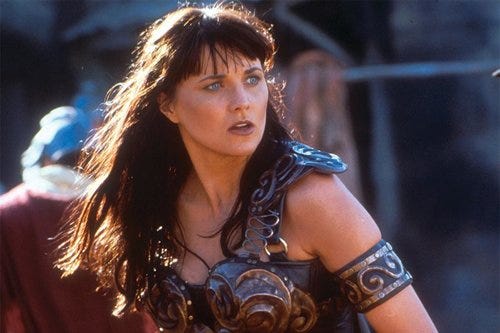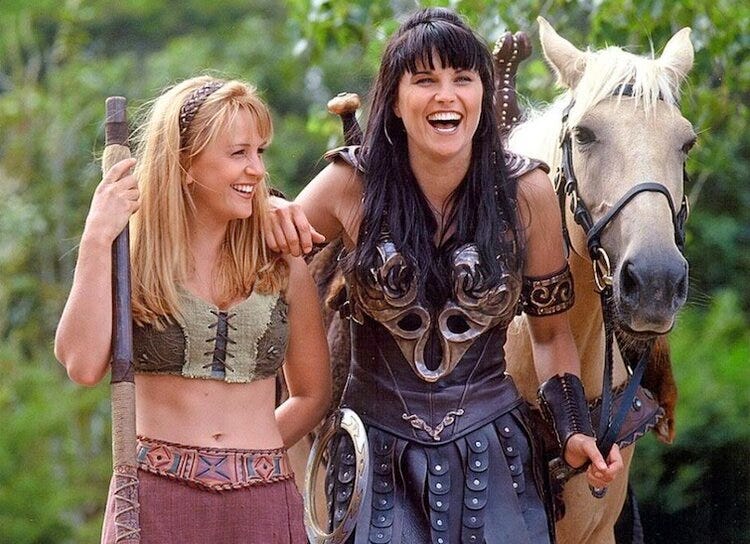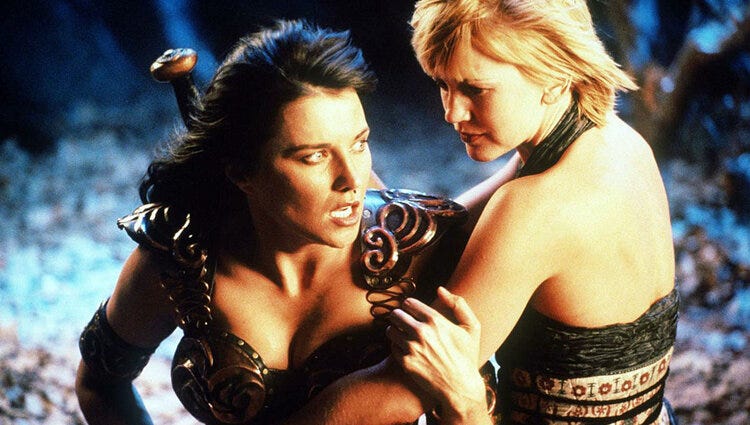xena: warrior princess
TV, 1995, 4 stars
Created: Robert Tapert
First Run: 1995-2001
Disclaimer: Many tears of nostalgia were shed during the writing of this review.
Similar to my review of Go Fish, I find myself incapable of merely reviewing Xena: Warrior Princess. The show is too much a part of me, of my experiences as a TV watcher, as a critic, as a writer, even as a lesbian. I find it next-to-impossible to remove myself to a fair enough distance to properly evaluate. I'm afraid if you've clicked onto this page you've inadvertantly fallen into the lair of a hard core nutball. A Xenite. A fan.
Like many others I was deeply affected by the stories of Xena Warrior Princess and Gabrielle the battling bard. True Xena fans are never ashamed to say that they love the show, despite the severe ups and downs the quality of the writing went through over the years.
From the first episode I saw (somewhere in season two) I was enthralled. Immediately I jumped on the Internet and discovered the huge fan community out there, particularly the fanfic community, one of the biggest and most active of any fandom, ever, even to this day.
Despite being ridiculed by some critics and dismissed entirely by others, Xena: Warrior Princess was an Emmy-winning show that truly connected with its target audience. For six years I let Xena into my heart and my loungeroom, I read and wrote fanfic, I made the dearest and best of friends, I built websites, I participated in fan communities, I spent hundreds if not thousands of dollars on merchandise.
X:WP first went to air on September 4th, 1995 as a spin-off from Hercules. Xena made her first appearance in that series in what is now known as "The Xena Trilogy" ("The Warrior Princess", "The Gauntlet" and "Unchained Heart"). The spin-off soon outrated the original series, becoming the highest-rated syndicated series in the USA during its second and third seasons. Episodes of the show still rate well in syndication, at the height of its popularity the show was screening in more than 50 countries and was translated into more than 20 different languages.
A flawed hero was born. Unlike other genre heroines though, Xena had no superpowers to help in her fight against evil. All she had was her intelligence, her will, her strength, her courage, her heart and of course her overachieving sidekick.
It didn't take long before fans began speculating on the Xena/Gabrielle relationship. When the producers caught wind that their lesbian audience was growing exponentially, they played up the lesbian subtext within the show itself. Some writers liked to go out of their way to play with it, while others avoided it or tried to establish Xena and/or Gabrielle as exclusively heterosexual.
As a result, going back to the canon and trying to pinpoint the exact nature of the relationship is a farcical exercise. There is enough evidence to support any position on it you wish to take, but the strength and ferocity of the debate sometimes took the hard core fans by surprise. When asked to weigh in while the show was in first run, Lucy Lawless and Renee O'Connor were obviously reluctant to pick a side on the issue, though in recent years both actresses have commented in interviews that they believe the pair were lovers.
Most fans recognise that the importance of the Xena/Gabrielle relationship lay in the love and loyalty between the two companions, regardless of sexuality. It emphasised the friendship and bonds that exist between women. It was better, I think, for people to be allowed to make up their own minds as to the extent of those bonds, despite how much subtext fans (myself included) cherished those rare overtly-romantic moments.
One thing that some TV critics failed to understand was that despite being a fantasy series, this show that was not suitable for children. Some of the worst episodes were dumbed down and aimed towards the younger demographic, but others were extremely violent, including the final episode that showed Xena being shot with hundreds of arrows, then having her decapitated head hung on display.
Xena was a violent character, which I am not ashamed to admit was one of the reasons I liked her. One of the most important messages of the show was always that violence is acceptable only as a last resort, when Xena was forced to accept violence as the solution she was strong, courageous, ferocious and unwavering.
Set up in deliberate opposition to the Xena character, Gabrielle was positioned as the negotiator whose first thought was towards the victims of violence. She believed that Xena was as much a victim of violence as a perpetrator.
As the series progressed their two viewpoints collided and clashed, but both always came to see some merit in the path chosen by the other. It seemed so simple and even silly at times, the themes universal, but the telling of it was more often than not both powerful and original.
X:WP was the first show I ever became aware of as having a social impact. This was because it had an impact on my own life and lives of people I knew, but it was my first experience with a show being able to be more than entertainment. X:WP made women feel empowered, gay or straight. Within the Xenaverse we made each other stronger, told stories to each other, and encouraged each other socially and creatively. I know this experience is not unique to Xena fans, but for me Xena really started it all.
If I ever meet Lucy Lawless it's possible I'll take one look into those seriously blue eyes, be instantly paralysed and not wake up until I've made a complete fool of myself. Or, I'll manage to keep control of my wits, shake her hand and thank her from the bottom of my heart for playing, with such humour and grace, the first superhero I ever looked up to. I sincerely hope it's the latter.
UPDATE: It was the former. But I do have a great picture of the occasion.




